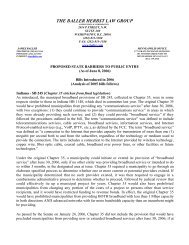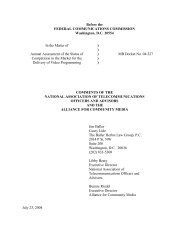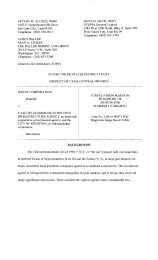Petition for Writ of Certiorari
Petition for Writ of Certiorari
Petition for Writ of Certiorari
Create successful ePaper yourself
Turn your PDF publications into a flip-book with our unique Google optimized e-Paper software.
13<br />
installed fiber optic facilities that they could use to provide telecommunications services in markets where there are<br />
currently no competitive alternatives.<br />
11. We continue to recognize, as the Commission did in the Texas Preemption Order, that municipal<br />
entry into telecommunications could raise issues regarding taxpayer protection from economic risks <strong>of</strong> entry, as well<br />
as questions concerning possible regulatory bias when a municipality acts as both a regulator and a competitor.<br />
While some parties maintain that these types <strong>of</strong> advantages make it unfair to allow municipalities and<br />
municipally_owned utilities to compete with private carriers, we believe these issues can be dealt with successfully<br />
through measures that are much less restrictive than an outright ban on entry, such as through non_discrimination<br />
requirements that require the municipal entity to operate in a manner that is separate from the municipality, thereby<br />
permitting consumers to reap the benefits <strong>of</strong> increased competition.<br />
A. Application <strong>of</strong> HB 620 to Municipalities<br />
12. HB 620 prohibits political subdivisions from becoming certified to provide telecommunications<br />
services or facilities. According to the Missouri Municipals, HB 620 there<strong>for</strong>e prohibits municipalities from<br />
providing such services themselves or from making their facilities available to others <strong>for</strong> use in competing with the<br />
incumbent providers. We are thus presented in this proceeding with the same issue that the Commission addressed<br />
in the Texas Preemption Order whether section 253 bars a state from deciding that it will not permit its<br />
subdivisions to compete in the provision <strong>of</strong> certain telecommunications services. This is a fundamental issue<br />
concerning the relationship between a state and its political subdivisions.<br />
13. Consistent with the Texas Preemption Order and the court’s holding in Abilene, we conclude that<br />
because municipalities, as political subdivisions <strong>of</strong> the state, are not “entities” within the meaning <strong>of</strong> section 253(a),<br />
HB 620 does not violate 253(a) to the extent that it prohibits them from becoming certified to provide<br />
telecommunications service or facilities. The Missouri Constitution authorizes cities with more that 5,000<br />
inhabitants to adopt city charters allowing them to operate independently <strong>of</strong> the state, except that they may not<br />
undertake any activities which are inconsistent with the state constitution or limited by statute. HB 620 is a statute<br />
the Missouri legislature has adopted to limit the powers <strong>of</strong> its political subdivisions, including its municipalities.<br />
HB 620 is there<strong>for</strong>e like section 3.251(d) <strong>of</strong> PURA95 in Texas in that it prohibits Missouri’s municipalities, as<br />
political subdivisions <strong>of</strong> the state, from providing telecommunications service. As we found in the Texas<br />
Preemption Order, preempting the en<strong>for</strong>cement <strong>of</strong> HB 620 as it applies to municipalities would insert the<br />
Commission into the relationship between the state <strong>of</strong> Missouri and its political subdivisions in a manner that was<br />
not intended by section 253.<br />
14. We are not persuaded by the Missouri Municipals’ arguments that we are not bound by the<br />
findings in the Texas Preemption Order or the Abilene decision regarding the scope <strong>of</strong> section 253(a). The court<br />
found in Abilene that although the text <strong>of</strong> section 253(a) refers broadly to “any entity,” such language is not clear<br />
enough to demonstrate, pursuant to Gregory, that Congress intended to intrude upon state_local government<br />
relationships. The Missouri Municipals, who filed their petition <strong>for</strong> preemption be<strong>for</strong>e the D.C. Circuit issued the<br />
January 1999 Abilene decision, argue in a supplemental filing that the Commission should not adhere to that<br />
decision, but should interpret the term “any” in section 253(a) in the same manner in which it interpreted that term in<br />
an unrelated proceeding issued after the Texas Preemption Order. Specifically, they point out that the Commission<br />
determined in the Pole Attachment Order that Congress’ use <strong>of</strong> the term, “any telecommunications carrier” in<br />
section 224 <strong>of</strong> the Act, which regulates utility pole attachments, is an express indication that Congress intended both<br />
wireless and wireline carriers to be able to attach equipment to public utility poles. They argue, by analogy, that the<br />
Commission should similarly recognize that “any entity” in section 253(a) is a plain language indication that<br />
Congress intended to include all entities, both publicly_ owned and privately_owned, within the scope <strong>of</strong> section<br />
253(a). The Eleventh Circuit held recently in Gulf Power Company v. FCC that despite Congress’ use <strong>of</strong> the term<br />
“any” in section 224, the Commission does not have authority to regulate pole attachments <strong>for</strong> wireless






